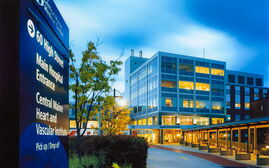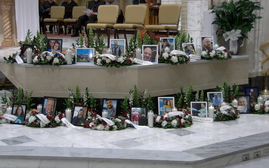
Business Leaders: Jeff Brickman scores results at once-struggling Central Maine Healthcare
 Photo / Tim Greenway
Jeff Brickman
Photo / Tim Greenway
Jeff Brickman
Jeff Brickman, a big sports fan, felt as though he was playing defense for his first two-plus years as CEO of Central Maine Healthcare.
Recently though, things have changed at the Lewiston-based health care system. He’s playing offense. Big time.
“That’s been a big part in the change in mood, and the change in focus and the change in energy for the organization,” Brickman says as he sits in his office overlooking downtown Lewiston. “When we had to go through our retrenching, and then rebalancing, that set us back a year.”
Now CMH is embarking on “some of the most exciting, transformative work that’s been seen in generations for our community,” he says.
Brickman took the job in September 2016, when CMH was losing $2 million to $3 million a month; he weathered no-confidence votes from doctors at the system’s three hospitals (Central Maine Medical Center in Lewiston, Rumford and Bridgton hospitals), 27% staff turnover, a group of Bridgton residents lobbying for the hospital to be sold, just to name a few challenges.
But in the past year and a half, the game has changed.
Physician turnover is now 4%, with 90 providers and 180 nurses hired in the past 18 months.
Bridgton and Rumford hospitals have gone from patient safety Leapfrog “C” ratings to three consecutive “A” ratings; the system has received national safety and quality accreditations in orthopedics, advanced primary stroke, rehabilitation medicine, bariatric surgery, among others.
Central Maine Heart and Vascular Institute, on the Lewiston hospital campus, was named one of the nation’s 50 top heart hospitals by IBM/Watson.
Topsham Care Center and Maine Urgent Care Center opened in Topsham; Lewiston’s Maine Urgent Care will open this month.
Partnerships were forged with Spectrum Healthcare, Quest Diagnostics, Shields Healthcare, New England Cancer Specialists and others.
Plans for a $38 million cancer center were announced in December; the state Department of Health and Human Services approved a preliminary certificate of need this month.
“Over the last 14 months as we’ve stabilized our workforce, stabilized our clinical staff, opened up access to our programs and our practices, we’ve made significant investments that we’ll continue to make this coming year...as we look at the demographics and the health care needs of the market that we serve.”
More simply, “All we are doing in our growth is meeting the community where they want to be met for services that they have been asking us to provide.”

The focus on oncology “is a good example of what we’re doing to meet that need.”
Androscoggin County has the highest cancer rate in Maine, but, historically, CMH hasn’t been able to meet that need. In the past 14 months, the hospital has recruited staff that “has given us a greater ability to take care of people locally than ever before.”
The cancer center will also be a significant investment in the local economy, as well as an upgrade to “cutting-edge oncology that will benefit this community.”
Another foundation of the turnaround has been building up the primary care staff.
“Primary care is probably the most important foundation of any health system, because that’s where the patient contact first begins,” Brickman says. “Having that kind of success with our primary care physicians, our nurse practitioners, that has been the key foundational part of our turnaround.”
CMH is also pursuing a value-based model based on improvements in technology and moving some health care out of the hospital, reducing costs.
“It’s recognizing that this is where health care needs to go in order to bend the cost curve to provide more affordable and accessible care at a high level of quality and service,” he says.
That’s what’s behind the development of the urgent care centers, where patients can get less expensive service for treatment they would’ve gone to the emergency room for in the past.
“It saves them money and it saves the health care system money,” he says. “And it begins to change the paradigm for how health care is going to be reshaped.”
That paradigm change is something that U.S. Sen. Angus King is also looking for. The two discussed it when King visited the under-construction Lewiston urgent care center last month.
Ben Tucker, King’s regional representative, got a look at the center during a legislative breakfast earlier in the month and knew King would want to see it.
One February afternoon, Tucker, King, Brickman and developer David Bateman toured the building with some CMH staff and Mainebiz.
King said he’s looking for ways to incentivize innovation in health care, particularly in rural areas, to make it less expensive for patients. He told Brickman the work CMH is doing is “exactly what I’m looking for.”
Brickman says the system is designed to work well into the future.
“Our approach has been to focus on access, to focus on affordability, to focus on population health and prevention so that we can do a better job of linking our strategies with health care policy and needs,” he says.
He’s worked at turning around other troubled health care systems, but says it’s taken 12 or 16 months longer than he expected to get CMH where it is now, but the challenges were worth it to build a strong sense of direction and focus, a level of higher quality and patient safety, all on a much stronger foundation.
The key to it all, he says, are the people — the staff and community that are at the heart of CMH.
“Our staff are our most important asset in this organization,” Brickman says. “They have demonstrated amazing patience, resiliency and loyalty. There’s something very special about our staff.”
He also credits a community that has “tremendous pride in its health care system and wants to see it be successful.”
Without the staff and community, “I don’t know that we would be at this point today.”













0 Comments